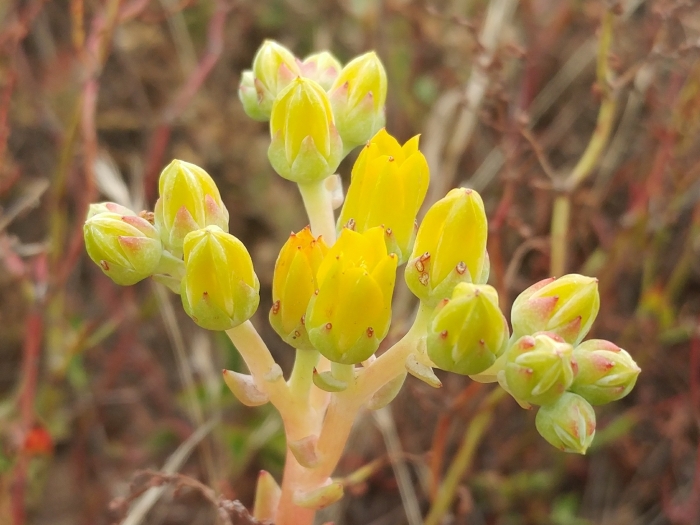Sea Lettuce
(Dudleya caespitosa)
Sea Lettuce (Dudleya caespitosa)
/
/

Casey H. Richart
CC BY 4.0
Image By:
Casey H. Richart
Recorded By:
Copyright:
CC BY 4.0
Copyright Notice:
Photo by: Casey H. Richart | License Type: CC BY 4.0 | License URL: http://creativecommons.org/licenses/by/4.0/ | Rights Holder: Casey H. Richart | Publisher: iNaturalist | Date Created: 2021-07-07T14:22:13-07:00 |






















































Estimated Native Range
Summary
Dudleya caespitosa, commonly known as Sea Lettuce, is an evergreen succulent native to the rocky cliffs and coastal bluffs of California, particularly thriving in the chaparral and coastal sage scrub communities. It forms caespitose clumps that can contain over 150 rosettes, each ranging from 8 to 32 cm wide with 15 to 30 leaves. The leaves are variable in shape, typically lance-oblong or oblong to oblanceolate, with acute to sub-acuminate tips. The non-twisting branches bear flowers on the topside, with petals that are bright yellow to orange-yellow or red, featuring an acute apex and erect tips. The flowering season is primarily in spring and summer, and the flowers are quite showy, attracting pollinators.
Sea Lettuce is valued for its drought tolerance and striking foliage, making it a suitable choice for rock gardens, succulent gardens, and as a ground cover in xeriscaping. It requires minimal maintenance and is an excellent plant for coastal gardens due to its salt spray tolerance. In cultivation, it thrives in full sun, requiring very low to low water amounts and well-drained soils. While it is generally disease-free, it can be susceptible to root rot if overwatered or planted in poorly drained soils. Dudleya caespitosa is also popular among collectors of succulents for its unique form and vibrant flower colors.CC BY-SA 4.0
Sea Lettuce is valued for its drought tolerance and striking foliage, making it a suitable choice for rock gardens, succulent gardens, and as a ground cover in xeriscaping. It requires minimal maintenance and is an excellent plant for coastal gardens due to its salt spray tolerance. In cultivation, it thrives in full sun, requiring very low to low water amounts and well-drained soils. While it is generally disease-free, it can be susceptible to root rot if overwatered or planted in poorly drained soils. Dudleya caespitosa is also popular among collectors of succulents for its unique form and vibrant flower colors.CC BY-SA 4.0
Plant Description
- Plant Type: Succulent
- Height: 0.2-0.4 feet
- Width: 0.2-0.4 feet
- Growth Rate: Moderate
- Flower Color: Yellow
- Flowering Season: Spring, Summer
- Leaf Retention: Evergreen
Growth Requirements
- Sun: Full Sun
- Water: Very Low
- Drainage: Fast
Common Uses
Bee Garden, Bird Garden, Deer Resistant, Drought Tolerant, Fire Resistant, Groundcover, Hummingbird Garden, Low Maintenance, Potted Plant, Rock Garden, Salt Tolerant, Showy Flowers, Street Planting
Natural Habitat
Rocky cliffs and coastal bluffs within chaparral and coastal sage scrub communities
Other Names
Common Names: Sand Lettuce , Coast Dudleya , Sealettuce
Scientific Names: Dudleya caespitosa , Echeveria californica , Dudleya helleri , Cotyledon caespitosa , Dudleya cotyledon , Echeveria caespitosa , Cotyledon californica , Cotyledon lingula , Dudleya lingula , Echeveria cotyledon
GBIF Accepted Name: Dudleya caespitosa (Haw.) Britton & Rose